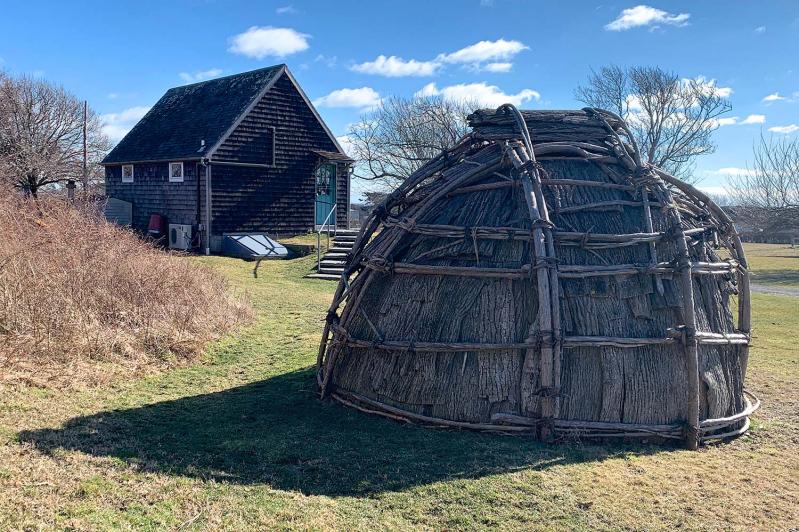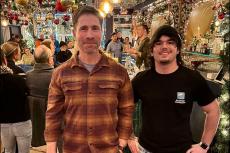Long Island’s Indigenous communities are hailing a new set of long-overdue rules, established by the Biden administration effective Jan. 12, that have museums and universities across the country covering up or altogether closing exhibits containing Native American funerary displays and other artifacts, which now must either be returned to sovereign tribes for reburial or displayed only with the permission of those Indigenous communities.
“We’ve been asking for this for a very long time and it’s finally coming to fruition,” said Becky Genia, a Shinnecock tribal member and head of the Graves Protection Warrior Society, consisting of advocates from the Shinnecock, Montaukett, and Unkechaug Nations. “We’ve been fighting the struggle for so long, knowing that our ancestors are in museums, colleges, institutions, and even attics or landfills. These remains are sacred to us. They hold powers and connection to our ancestors and the creator. It’s our culture, our tradition, to respect the dead.”
The rules now shift the responsibility of repatriation to the museums and similar institutions, rather than the Indigenous groups themselves.
“I’m overwhelmed by that in a very good way. I have been fighting these institutions for decades to return these items,” said Chief Harry Wallace of the Unkechaug Indian Nation, the Shinnecock Nation’s neighbors just to the west. “They have known that these are desecrated items that do not belong in their collections. They were either stolen or purchased from people who stole them, or were dug up when industrialization occurred and graves were robbed of funerary objects and remains.”
The New York Times reported Jan. 26 that the American Museum of Natural History in New York City has closed two entire halls — those dedicated to tribes of the Eastern Woodlands and Great Plains — while others such as the Metropolitan Museum of Art, the Field Museum in Chicago, and the Peabody Museum of Archaeology and Ethnology at Harvard University are also removing certain objects, such as musical instruments and clothing, from public display.
The new rules are meant to speed up implementation of the Native American Graves Protection and Repatriation Act, which Congress passed in 1990. Notably, the new rules allow not just tribes with federal and state recognition to reclaim their heritage in this manner, but also now “historic tribes and organizations,” including the local tribe for whom restoration of state recognition has been the subject of five gubernatorial vetoes in New York State over the last decade — the Montaukett Indian Nation.
“I love it. I love it,” Sandi Brewster-walker, a representative of the Montaukett Nation, said in a phone call on Friday. “We fall under ‘historic tribes’ until the state recognition is back, so it covers us now.”
The Biden administration said in its Jan. 12 order that “the passage of these proposed revisions is a necessary step towards addressing the legacy of colonial injustices imposed upon Indigenous peoples in the United States.”
According to Ms. Brewster-walker, the American Museum of Natural History has in its collection “53 sets of artifacts,” that are Montaukett, including “two or three sets of remains.” The Peabody Museum has some Montaukett objects, too, she said. So does the Garvies Point Museum and Preserve in the Nassau County city of Glen Cove, though there has been confusion over the origins of some objects there, which were thought at one time to be of Shinnecock origin but which Ms. Brewster-walker says are in fact Montaukett based on the documentation of where those items were found.
“These are our ancestors, and I think that they should be returned and re-interred,” she said. Related funerary items “should be placed back with the remains into a grave, because that was grave robbing. For any other artifacts that are cultural, some museums we will give permission with a letter of a gift or permission to hold them.”
That will be a discussion the Montauketts have with the Montauk Indian Museum and the Montauk Point Lighthouse, Ms. Brewster-walker said.
These two entities will also need to address their displays, but because they are now closed for the winter season, there is the benefit of time to fulfill that obligation in a thoughtful way, said Mia Certic, executive director of the Montauk Historical Society, which runs the Lighthouse and museum.
“We don’t want to rush anything,” she said in an interview. “Everything we do we want to be in conjunction with the approval of the Montauketts. Personally, I think it’s appropriate. It’s going to be tricky for everybody, but it’s been a long time coming and it makes sense to me. We have people around with a very clear understanding of the significance of these artifacts, and I think they should have a say in how those things are presented to the world.”
Ms. Certic said the museum and Lighthouse have exhibits including Native American stone tools and an educational mural. A “gray area,” she said, may be their replicas of items such as a wampum belt and a dugout canoe, which are close representations of cultural objects but are not authentic themselves.
Organizations that have Native American artifacts in their collections are required by the Biden administration to submit an inventory of those objects by March 11. The administration also provides compensation for tribal members’ travel and transportation to reclaim their ancestors’ remains.
Rainbow Chavis, a Shinnecock member who is closely involved with the Graves Protection Warrior Society, said the challenge now is finding suitable locations to re-inter these remains.
“We’re figuring it out at a very fast pace,” she said, “because we don’t want to miss any opportunity to get our people’s remains and funerary objects back in our possession.”
The experience of reclaiming funerary objects “is quite an energy-pulling experience. . . . You kind of wonder, ‘Where’s the rest of everything that was there?’ “ Ms. Chavis said.
Ms. Genia said the tribes are also balancing the need for reburial of sacred items with the need to educate people outside Indigenous communities. Otherwise, she said, “they’ll try to erase us completely. These objects help us connect with our present and future so that people can never say ‘you don’t belong here.’ "




